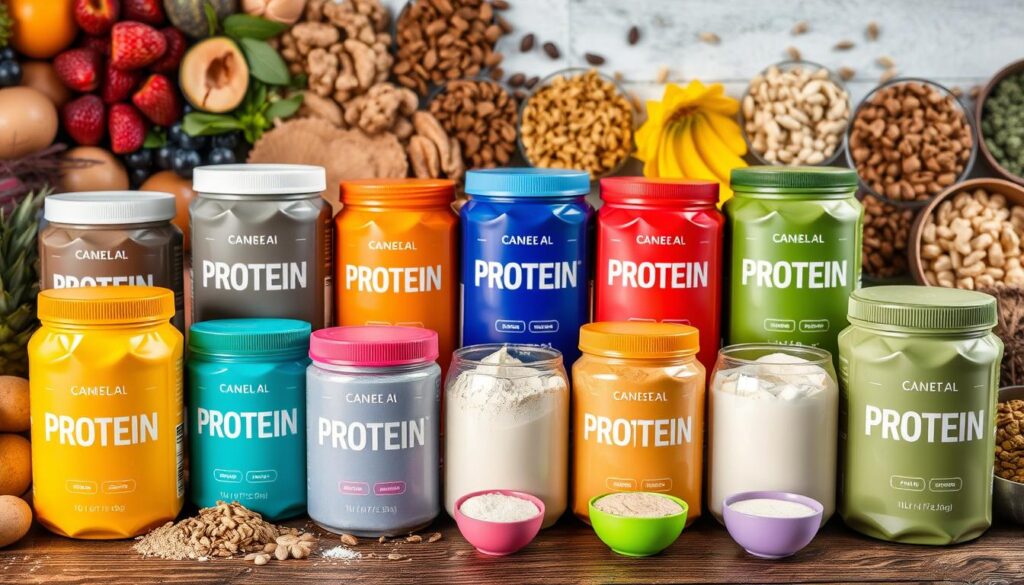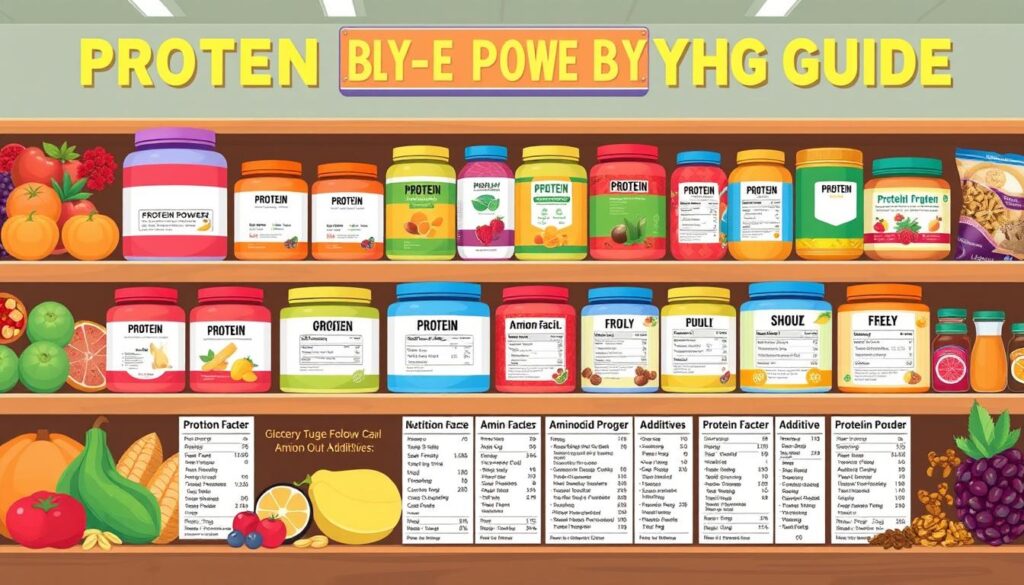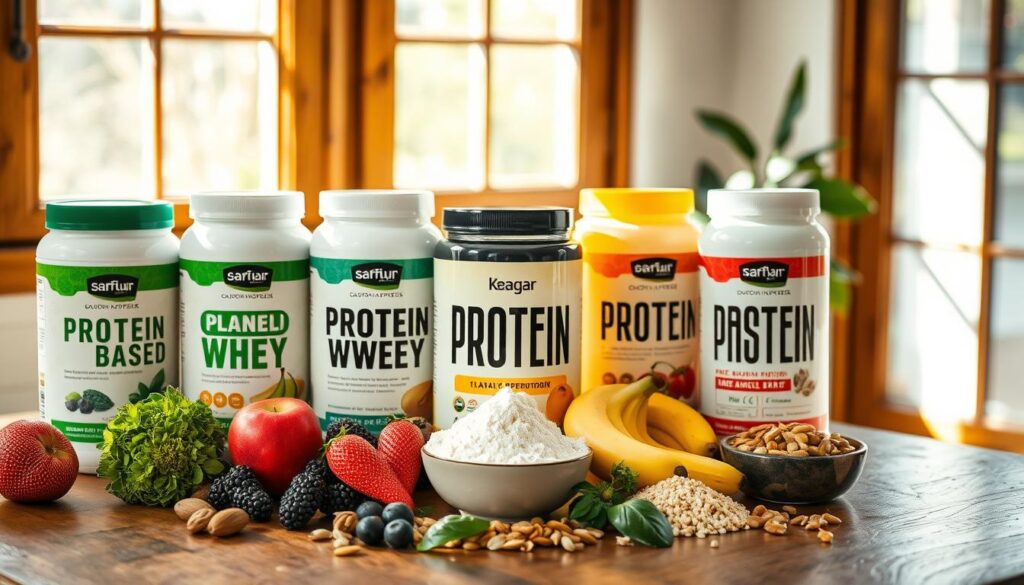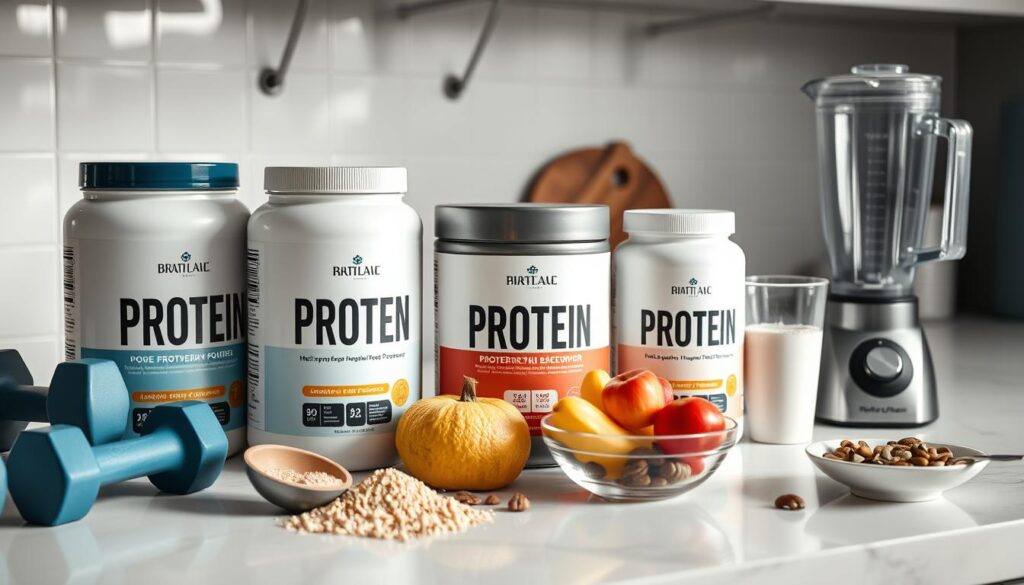How to Choose the Right Protein Powder
Choosing the right protein powder can be overwhelming, especially with the numerous options available in the market. To find the best protein powder for me, it’s essential to consider several factors, including my fitness goals and dietary needs. Learning how to choose the right protein powder is crucial for achieving my desired results. With so many options available, it’s vital to have a comprehensive guide that provides protein powder selection tips to help me make an informed decision.
When it comes to selecting the perfect protein supplement, I need to consider my specific needs and goals. Whether I’m looking to lose weight, build muscle, or simply maintain my overall health, there’s a protein powder out there that’s right for me. By following a few simple steps and considering key factors, I can find the best protein powder for my needs and achieve my fitness goals. Learning how to choose the right protein powder is the first step towards a successful fitness journey.
Introduction to Protein Powder Selection
With so many options available, it’s essential to have a clear understanding of what to look for in a protein powder. From understanding the different types of protein powders to considering key nutritional factors, there are several things to keep in mind when making my selection. By taking the time to learn about protein powder and how to choose the right one, I can ensure that I’m getting the most out of my supplement and achieving my desired results.
Key Takeaways
- Learning how to choose the right protein powder is essential for achieving my fitness goals.
- Considering my specific needs and goals is crucial when selecting a protein powder.
- There are several types of protein powders available, each with its own unique benefits and drawbacks.
- Key nutritional factors, such as protein content and amino acid profile, should be considered when making my selection.
- Following a few simple steps and considering key factors can help me find the best protein powder for my needs.
- How to choose the right protein powder is a critical step in my fitness journey.
- Protein powder selection tips can help me make an informed decision and achieve my desired results.
Understanding Protein Powder Basics
When it comes to choosing the perfect protein supplement, it’s essential to understand the basics of protein powders. This knowledge will help you make an informed decision and find the best product for your needs. Considering factors for selecting protein powder is crucial in this process.
A protein powder buying guide typically starts with the fundamentals: what protein powders are and why they are used. Protein powders are dietary supplements made from various sources such as whey, casein, soy, and pea. They are designed to provide a concentrated dose of protein to support muscle growth, repair, and maintenance.
What Are Protein Powders?
Protein powders are made by extracting protein from various food sources and then processing it into a powder form. This process makes it easier to consume a high amount of protein in a single serving.
Why Use Protein Supplements?
Protein supplements are used for various reasons, including to support muscle growth and repair, aid in weight loss, and enhance athletic performance. They are particularly useful for individuals who struggle to get enough protein from their regular diet.
Common Protein Sources Explained
Some common protein sources include:
- Whey protein: derived from milk, high in essential amino acids
- Casein protein: also derived from milk, provides a slower release of amino acids
- Soy protein: plant-based, often used by vegetarians and vegans
- Pea protein: plant-based, highly digestible and hypoallergenic
Understanding these basics and considering factors for selecting protein powder will help you navigate the market and find the best protein powder buying guide for your specific needs, ultimately leading to choosing the perfect protein supplement for you.
Different Types of Protein Powders Available
When it comes to protein powder selection criteria, there are several factors to consider. With numerous types of protein powders available, it can be challenging to find the right protein powder that meets your fitness goals and dietary needs. A protein powder comparison guide can help you navigate the various options and make an informed decision.
Some of the most common types of protein powders include whey, casein, soy, pea, and egg protein. Each type has its unique characteristics, benefits, and drawbacks. For example, whey protein is absorbed quickly by the body, making it ideal for post-workout recovery. On the other hand, casein protein is absorbed more slowly, making it suitable for before bedtime consumption.
- Whey protein: fast absorption rate, ideal for post-workout recovery
- Casein protein: slow absorption rate, suitable for before bedtime consumption
- Soy protein: plant-based, suitable for vegetarians and vegans
- Pea protein: hypoallergenic, rich in essential amino acids
- Egg protein: high-quality protein, rich in branched-chain amino acids
When choosing a protein powder, consider your dietary needs and preferences. If you’re lactose intolerant, you may want to opt for a lactose-free or plant-based protein powder. If you’re looking for a high-quality protein powder with a complete amino acid profile, you may want to consider a whey or egg protein powder.

How to Choose the Right Protein Powder for Your Goals
When it comes to selecting a protein powder, it’s essential to consider your specific fitness goals. Whether you’re looking to lose weight, build muscle, or maintain general fitness, the right protein powder can help you achieve your objectives. To find the best protein powder for me, I need to consider my individual needs and preferences.
Here are some factors to consider when choosing a protein powder:
- Protein content per serving
- Amino acid profile
- Additional nutrients and supplements
By considering these factors and following protein powder selection tips, you can make an informed decision and find a protein powder that aligns with your goals.
For example, if your goal is weight loss, you may want to look for a protein powder that is low in calories and sugar. On the other hand, if you’re looking to build muscle, you may want to consider a protein powder with a high protein content and a balanced amino acid profile. By understanding how to choose the right protein powder, you can take the first step towards achieving your fitness goals.
Key Nutritional Factors to Consider
When selecting a protein powder, it’s essential to consider the key nutritional factors that can impact the effectiveness of the supplement. Factors for selecting protein powder include protein content per serving, amino acid profile, and additional nutrients and supplements. A protein powder buying guide can help you navigate these factors and choose the perfect protein supplement for your fitness goals.
A well-structured protein powder buying guide should include information on protein content per serving, which can vary significantly between products. Choosing the perfect protein supplement requires careful consideration of this factor, as it can affect the overall effectiveness of the supplement. Some key considerations include:
- Protein content per serving: Look for a protein powder that contains a sufficient amount of protein per serving to support your fitness goals.
- Amino acid profile: Consider the amino acid profile of the protein powder, including the presence of essential amino acids and branched-chain amino acids.
- Additional nutrients and supplements: Some protein powders may include additional nutrients and supplements, such as vitamins, minerals, and creatine.
By considering these key nutritional factors, you can make an informed decision when choosing a protein powder. Remember to always follow a protein powder buying guide and carefully evaluate the factors for selecting protein powder to ensure you choose a supplement that meets your needs and supports your fitness goals.

Understanding Protein Powder Labels
When it comes to protein powder selection criteria, understanding the label is crucial. With so many options available, it can be overwhelming to find the right protein powder that meets your needs. A protein powder comparison guide can be helpful, but it’s essential to know what to look for on the label.
To make an informed decision, consider the following factors:
- Ingredient list: Check for any allergens or ingredients you may be sensitive to.
- Nutrition facts: Look for the protein content per serving and other essential nutrients.
- Certifications: Check for third-party certifications, such as NSF International or Informed-Choice, which ensure the product meets certain standards.
By considering these factors and using a protein powder comparison guide, you can find the right protein powder that aligns with your goals and preferences. Remember to always read the label carefully and don’t hesitate to reach out to the manufacturer if you have any questions.
Common Dietary Restrictions and Alternatives
When considering how to choose the right protein powder, it’s essential to think about dietary restrictions and alternatives. With the increasing demand for specialized products, many brands now offer vegan, lactose-free, and gluten-free options. To find the best protein powder for me, I need to consider my individual needs and preferences.
Protein powder selection tips include researching the different types of protein sources and their benefits. For example, pea protein and rice protein are popular vegan options, while whey protein and casein protein are often lactose-free. Gluten-free varieties are also widely available, making it easier to find a suitable protein powder.

- Vegan options: pea protein, rice protein, and hemp protein
- Lactose-free choices: whey protein, casein protein, and egg protein
- Gluten-free varieties: rice protein, corn protein, and potato protein
By taking the time to research and understand the different options available, individuals can make informed decisions and find the best protein powder for their needs. Whether you’re looking for a vegan, lactose-free, or gluten-free option, there are plenty of choices on the market. Remember to always read labels carefully and consider factors like protein content, amino acid profile, and additional nutrients when making your selection.
| Protein Source | Dietary Restriction | Benefits |
|---|---|---|
| Pea Protein | Vegan | High protein content, easy to digest |
| Whey Protein | Lactose-free | Fast absorption, high amino acid profile |
| Rice Protein | Gluten-free | Hypoallergenic, easy to digest |
Price vs. Quality: Making the Right Investment
When it comes to protein powders, the relationship between price and quality is crucial. To find the right protein powder, consider the protein powder selection criteria that matter most to your fitness goals. A protein powder comparison guide can help you evaluate different products and make an informed decision.
Several factors affect the price of protein powders, including the source and quality of the protein, additional nutrients and supplements, and the manufacturing process. High-quality protein powders may be more expensive, but they often provide better results and are a worthwhile investment for those serious about their fitness goals.
To make the right investment, consider the following:
- Research different protein powder options and read reviews from other customers
- Compare prices and look for discounts or promotions
- Evaluate the protein powder’s nutritional content and ingredients
A good protein powder comparison guide can help you navigate the market and find a product that meets your needs and budget. By prioritizing quality and considering your protein powder selection criteria, you can find the right protein powder to support your fitness goals.
Ultimately, investing in a high-quality protein powder is a smart decision for those serious about their fitness goals. By doing your research and considering your options carefully, you can find a protein powder that provides the results you need and fits within your budget.
| Protein Powder | Price | Quality |
|---|---|---|
| Whey Protein | $20-$30 | High |
| Casein Protein | $25-$35 | High |
| Plant-Based Protein | $15-$25 | Medium |
Timing and Usage Guidelines
When it comes to getting the most out of your protein powder, timing is everything. To choose the right protein powder for your needs, consider how you plan to use it. For example, if you’re looking for a pre-workout boost, you may want to opt for a protein powder that is easily digestible and can provide a quick energy boost. On the other hand, if you’re looking for a post-workout recovery aid, you may want to choose a protein powder that is high in branched-chain amino acids (BCAAs) to help with muscle recovery.
Understanding how to choose the right protein powder and following protein powder selection tips can make a big difference in your fitness journey. The best protein powder for me will depend on my individual needs and goals. For instance, if I’m trying to lose weight, I may want to choose a protein powder that is low in calories and sugar. If I’m trying to build muscle, I may want to choose a protein powder that is high in protein and has a good amino acid profile.
Pre-Workout Consumption
Consuming protein powder before a workout can help increase energy and endurance. It’s also important to consider the type of protein powder you’re using and how it will affect your body during exercise. Some protein powders, such as whey protein, are quickly absorbed by the body and can provide a rapid energy boost. Others, such as casein protein, are absorbed more slowly and can provide a more sustained energy release.

Post-Workout Benefits
After a workout, consuming protein powder can help with muscle recovery and growth. It’s essential to choose a protein powder that is high in BCAAs and other essential amino acids to help repair and rebuild muscle tissue. Additionally, considering how to choose the right protein powder and following protein powder selection tips can help you make the most out of your post-workout routine.
Potential Side Effects and Considerations
When considering factors for selecting protein powder, it’s essential to think about potential side effects. Choosing the perfect protein supplement requires careful consideration of individual needs and health status. A protein powder buying guide should include information on common digestive issues, such as bloating, gas, and stomach cramps.
Some individuals may experience allergic reactions to certain types of protein powder, such as whey or soy. It’s crucial to read labels carefully and look for certifications like “hypoallergenic” or “allergy-friendly.” Additionally, medication interactions can occur, so it’s vital to consult with a healthcare professional before starting any new supplement regimen.
To minimize the risk of side effects, consider the following:
- Start with a small dose and gradually increase as needed
- Choose a protein powder from a reputable manufacturer
- Be aware of potential interactions with medications or other supplements
By being informed and taking a thoughtful approach to selecting a protein powder, individuals can minimize the risk of side effects and ensure a safe and effective supplement experience.
| Protein Powder Type | Potential Side Effects |
|---|---|
| Whey Protein | Bloating, gas, stomach cramps |
| Soy Protein | Allergic reactions, digestive issues |
| Pea Protein | None or minimal side effects reported |
Conclusion: Making Your Final Protein Powder Selection
In conclusion, selecting the perfect protein powder requires carefully weighing various factors, from your fitness goals and dietary needs to personal preferences. By understanding the key considerations outlined in this comprehensive guide, you can make an informed decision that aligns with your unique health and wellness objectives.
Whether your aim is weight loss, muscle building, general fitness maintenance, or enhanced athletic performance, there is a high-quality protein powder solution tailored to your specific requirements. Evaluate the protein content, amino acid profile, and additional nutrients to find the right balance for your body.
Remember to also consider any dietary restrictions or allergies, as well as your budget, to ensure you make the most suitable protein powder investment. By following the guidelines outlined in this article, you can confidently find the right protein powder and incorporate it into your routine for optimal results.
FAQ
What are protein powders?
Protein powders are dietary supplements made from various sources such as whey, casein, soy, and pea. They are designed to provide a concentrated dose of protein to support muscle growth, repair, and maintenance.
Why use protein supplements?
Protein supplements are used to help meet increased protein needs for muscle building, weight loss, and athletic performance. They can be a convenient way to boost protein intake, especially for individuals who have difficulty meeting their daily protein requirements through whole foods alone.
What are the common types of protein powders?
The most common types of protein powders include whey, casein, soy, pea, and egg protein. Each type has its own unique characteristics, benefits, and drawbacks, which should be considered when selecting the right protein powder for your goals.
How do I choose the right protein powder for my weight loss goals?
When choosing a protein powder for weight loss, look for one with a high protein content per serving, low in carbohydrates and fat, and potentially with added ingredients like fiber or green tea extract to support your weight management goals.
What factors should I consider when selecting a protein powder for muscle building?
For muscle building, focus on protein powders with a complete amino acid profile, high in branched-chain amino acids (BCAAs), and potentially with additional supplements like creatine or beta-alanine to support muscle growth and recovery.
How do I find a protein powder that meets my dietary restrictions?
If you have dietary restrictions, such as being vegan, lactose-intolerant, or gluten-free, look for protein powders that specifically cater to those needs. Opt for plant-based, lactose-free, or gluten-free protein powder options.
How do I read and understand protein powder labels?
When reading protein powder labels, pay attention to the protein content per serving, the type of protein used, the amino acid profile, and any additional ingredients or certifications. Understanding the label will help you make an informed decision about the quality and suitability of the protein powder.
How should I time the consumption of my protein powder?
Protein powder can be consumed at different times, depending on your goals. For pre-workout, it can provide energy and support muscle performance. Post-workout, it can aid in muscle recovery and growth. For general daily use, it can help meet your overall protein needs.
Are there any potential side effects or considerations when using protein powder?
Some potential side effects of protein powder include digestive issues, allergic reactions, and medication interactions. It’s important to be aware of your individual sensitivities and consult with a healthcare professional if you have any concerns or medical conditions.




